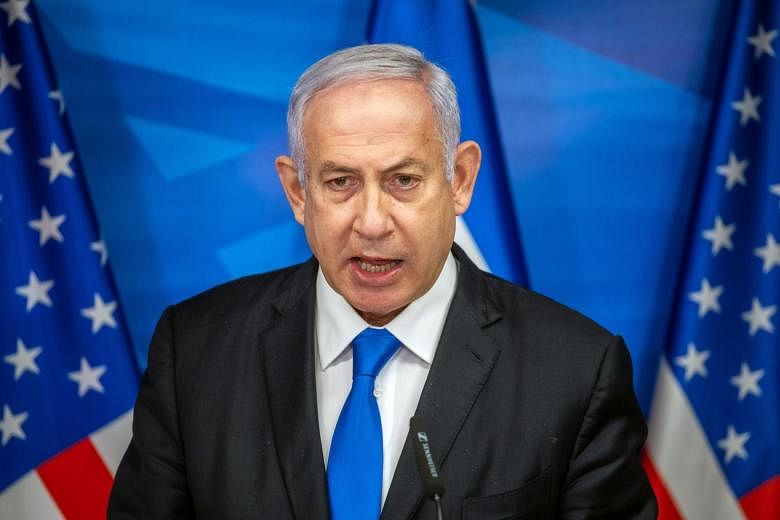JERUSALEM (AFP) - Israel's Prime Minister Benjamin Netanyahu, under pressure in his fourth re-election battle in two years, is trying to court voters he has previously demonised: Arab Israelis.
"A new era begins today," the veteran right-wing premier said during a rare visit this month to Nazareth, Israel's largest Arab city.
Mr Netanyahu, threatened by a damaging split in his Likud party, has made several stops in a game-changing charm offensive toward Arab voters that some observers have found jarring.
He highlighted Israel's rapid novel coronavirus inoculation pace at a vaccination centre in Umm al-Fahm on Jan 1, while in Nazareth he promised investment and anti-crime initiatives and apologised for potentially offensive past remarks.
Arab Israelis - Palestinians who stayed on their land following the Jewish state's creation in 1948, and their descendants - make up about 20 per cent of the country's roughly nine million people.
The community's growing political importance was evident in the last vote, in March 2020, when the mainly Arab Joint List alliance won an unprecedented 15 seats in the 120-member Knesset, forming a key part of the anti-Netanyahu bloc.
Mr Netanyahu, a hardliner on the Israel-Palestinian conflict, has on several occasions in recent years condemned Arab Israelis and their political leaders as terrorism supporters and enemies of the Jewish state.
Experts described his new pitch to Arabs as a nuanced political manoeuvre aimed at boosting his own support while also sowing enough political chaos to discourage some Arabs from voting, thereby trimming the influence of his Arab rivals.
Mr Netanyahu is seeking to "win Arab votes but especially wants to weaken the Joint List", Tel Aviv University political science professor Jamal Amal told AFP.
Among Mr Netanyahu's long record of anti-Arab rhetoric, a statement from Israel's 2015 election stands out.
In a polling-day bid to energise right-wing voters, he warned that Arab Israelis were voting "in droves" and suggested left-wing groups had bussed Arab citizens to polling stations.
Then-US president Barack Obama accused Mr Netanyahu of portraying Arab Israelis as "an invading force".
Arabs have long complained of discrimination by Israeli police, and insist their plight has worsened since Mr Netanyahu returned to power in 2009.
The so-called Nation-State law passed in 2018 at Mr Netanyahu's urging, which declared Israel as the "national home of the Jewish people", was widely perceived as legally downgrading Arabs as lesser citizens.
Despite that record, Mr Netanyahu has often argued that his governments have invested heavily in minority communities and "done more for Arabs than any other government".
While some protesters in Nazareth attempted to shout Mr Netanyahu down, the premier secured an endorsement from the city's mayor Ali Salam.
'Breaking the polygraph'
Mr Netanyahu, known as the great survivor of Israeli politics, faces the daunting challenge of securing a 61-seat Knesset majority in Israel's March 23 election.
Multiple recent polls suggest that right-wing Likud defector Gideon Saar, who has formed his own New Hope party, could peel a substantial number of seats away from Mr Netanyahu.
Mr Saar has categorically ruled out joining a Mr Netanyahu-led government.
The pledge, if true, could deliver a hammer blow to the premier, who failed to secure a majority in three elections since April 2019 when Likud was united behind him.
The fraught coalition he formed with his centrist rival Benny Gantz in May following the third inconclusive election collapsed last month.
Because of the Saar threat and the dangers posed by his upcoming corruption trial, Mr Netanyahu has been forced to seek support in unfamiliar terrain, experts said.
The prime minister has reached out to Mr Mansour Abbas, a lawmaker from the Joint List, who is at odds with the Arab alliance.
Political analyst Yoav Stern told AFP he believes Mr Netanyahu's true strategy is "to confuse Arab voters" so they will "tell themselves that all parties are equal and there is no reason to go and vote".
Mr Jafar Farah, who heads the Mossawa Centre that works to defend Arab Israeli rights, said Mr Netanyahu has decided to soften his anti-Arab rhetoric because he fears that energising Jewish nationalist sentiment could benefit his right-wing opponents.
Joint List member Ahmad Tibi, more bluntly, charged that underlying Mr Netanyahu's bid to win over Arabs is a dishonesty that has defined the premier's political career.
"If we gave Netanyahu a polygraph test," Mr Tibi said, "the machine would break because it wouldn't be able to cope with that many lies."

